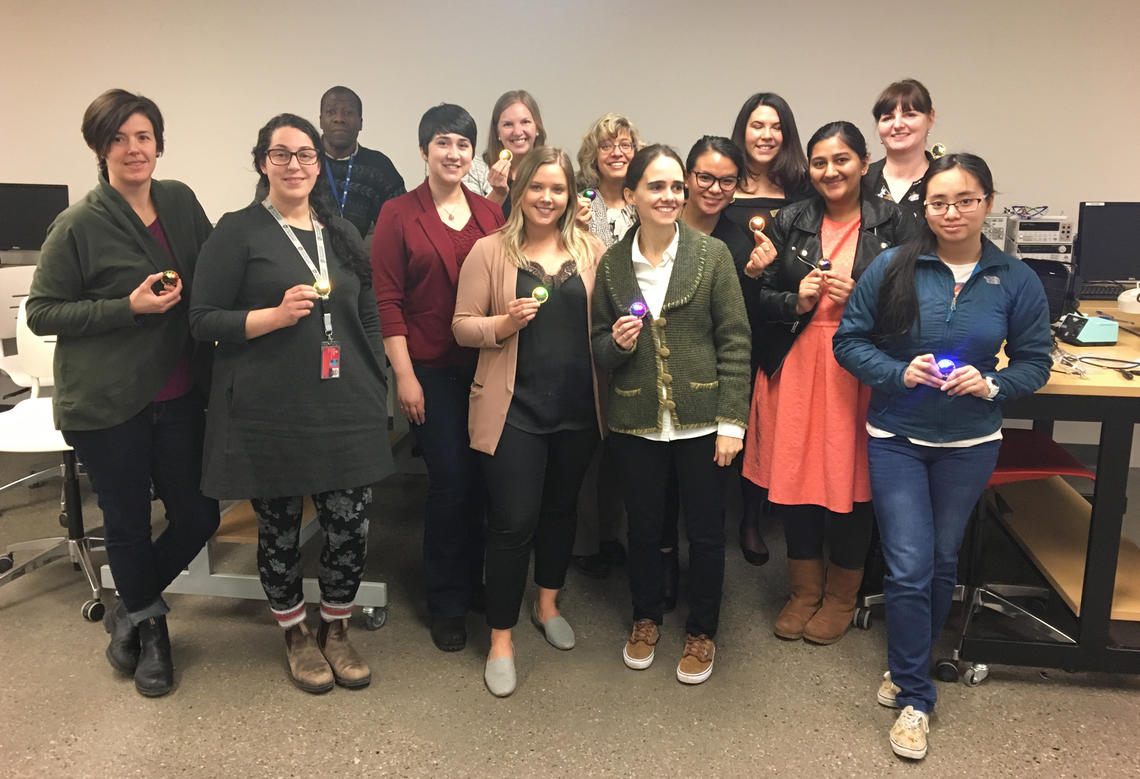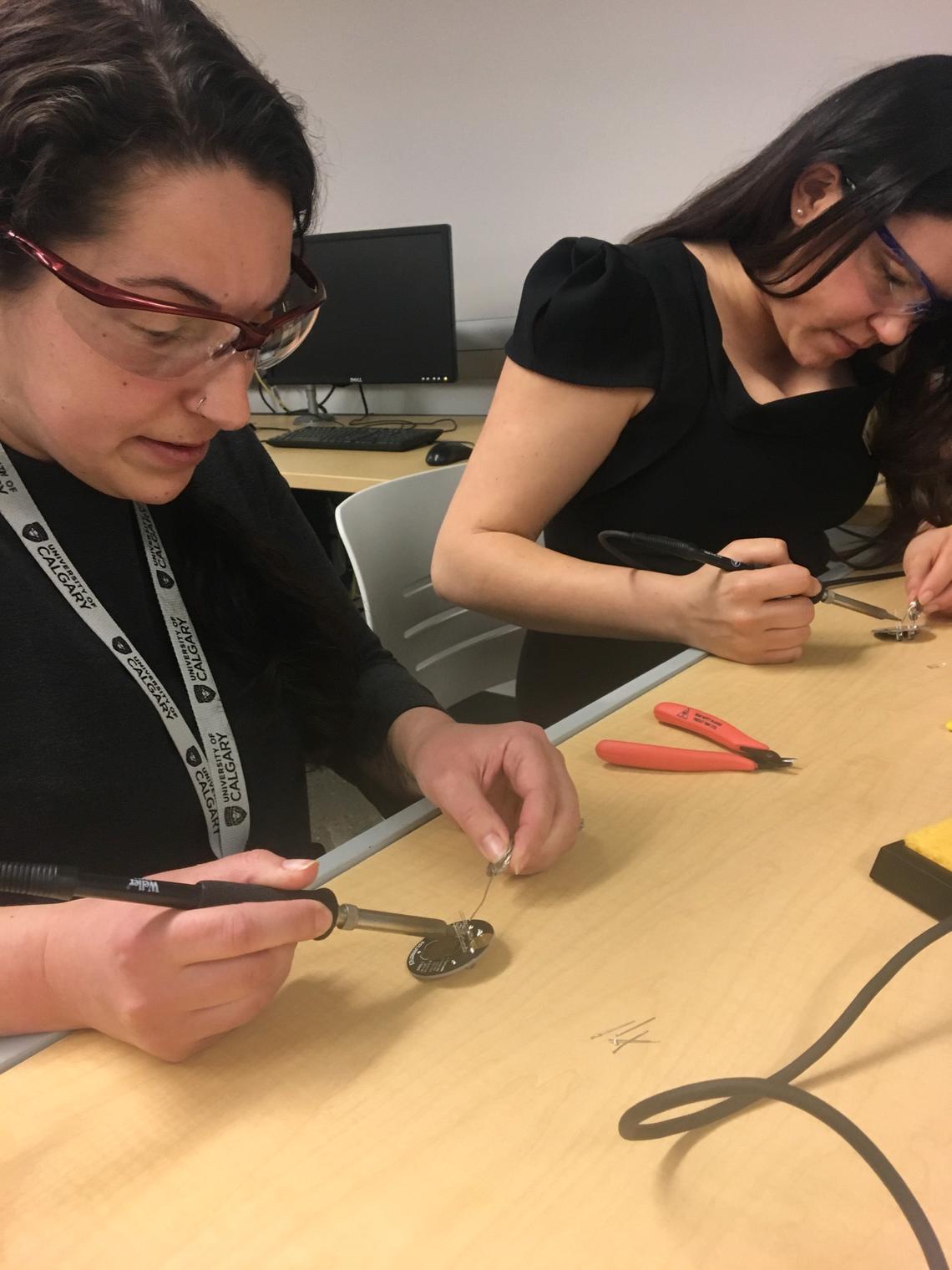March 8, 2018
International Women's Day a time to reflect on women in research roles

The man in the back row is Chris Simon, soldering instructor, at the She Leads: Soldering Workshop.
Michael Platt, Schulich School of Engineering
The soldering lesson, an exercise in steady hands and intense concentration, is a universal success.
The reward for completing the painstaking circuit is a small, electrified LED button, and naturally, the She Leads: Soldering Workshop ends with a team photograph.
Proudly displayed by the 12 women who signed up for the University of Calgary soldering lesson, the symbolism of the dozen bright lights couldn’t be more apt.
Once dominated by a single gender, STEM is no longer a field for men and men alone — and as the world celebrates International Women’s Day on March 8, it’s impossible to overlook that many of the brightest lights in science, technology, engineering and math are now women.
We asked some leading lights at Schulich School of Engineering about women in STEM, and the challenges that remain.
More women a welcome change
For Schulich School of Engineering’s Qiao Sun, the growing number of women in labs and classrooms is a refreshing change from 35 years ago, when she was one of three female undergrads in a class of 36.
“There were many barriers when I started, the biggest being that as a society there are roles that we assume and women are supposed to be a certain way and men are supposed to be a certain way,” recalls Sun, associate dean of diversity & equity at Schulich. “These are the stereotypes, and it takes many things to change that — for example, as parents, what we teach our children.”
Sun is a leader in putting the achievements of female researchers in the spotlight, and on March 5, spearheaded by her efforts, the University of Calgary hosted a live satellite event in conjunction with Stanford University’s Women in Data Science (WiDS) Conference.
More than 90 registered guests watched women scientists present their research from Calgary — joining 75,000 people from 75 countries around the world — and Sun says such events help to build the self-confidence women need to enter the world of STEM.
“Society puts so many constraints and assumptions on the gender role and women can internalize that, and question whether they should be there, are they imposters,” says Sun. “We need to put the spotlight on women, to show other women what they are capable of.”
Women help maximize potential
Emily Wyatt is Schulich’s diversity specialist, and from organizing the She Leads: Soldering Workshop as part of Women in Work Week to hosting a viewing of Wonder Woman to celebrate International Women’s Day, she’s all about inspiring the engineers and entrepreneurs of tomorrow.
Wyatt says diversity is to everyone’s benefit.
“Women bring diversity to teams, and diversity has been proven to increase creativity, productivity and even profit margins,” she explains. “For engineering and other STEM fields where women are underrepresented, we’ve been missing the mark on maximizing our potential, and making sure all viewpoints and ideas are appreciated and developed.”

Participants at the She Leads: Soldering Workshop each made a small LED button.
Michael Platt, Schulich School of Engineering
Wanted: female role models
Ali Barrett is the program co-ordinator for Cybermentor, a Schulich-founded program that links inspiring women in STEM fields with female students in Grades 6 to 12 across Alberta.
“STEM is all about innovation and change, and if you have all the same sort of people working in a field, they’ll be less likely to be innovative,” states Barrett.
She says the lack of women to look up to in science, technology, engineering and so forth hinders many girls from imagining a future in research: “The lack of role models in media and their lives is an issue. That’s why events focused on women are so important, to help show what women are doing, and what they are capable of.”
Confidence a major hurdle
For Mozhdeh Shahbazi, assistant professor in the Department of Geomatics, the biggest challenge for women wanting to enter careers in STEM is the confidence that they belong.
“Confidence in self while being judged by male fellow engineers is an internal challenge for most women in our profession,” explains Shahbazi, who works with Cybermentor and helped organize the Calgary WiDS conference.
At the same time, she says men need to be taught to accept women as equals in their field. “A man's neurons get activated against a strong opinionated woman simply because his brain is trained to since his childhood. So, we just have to educate or ‘train’ young brains to be indifferent to facts like gender differences in the work environment.”
A bright future for women — and everyone
Schulich instructor Emily Marasco is just finishing her PhD in electrical engineering, while using her background as a musician to help teach creativity in engineering. She says the greatest change since starting her university education 12 years ago is how much more accepting younger students are of women and diversity in general — indeed she sees a very bright future for a STEM world that’s open to everyone.
“We now care more about what people are bringing to the table and trying to attract those diverse backgrounds,” says Marasco.
“Another positive is that peers are no longer tolerant of some of these biases — the old guard might be resistant, but that’s not coming from my peers or our students. Every year, our students are more tolerant of diversity.”
